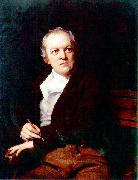Großhandels China Öl Gemälde & Rahmt Ein |
|||||||||||

|
|||||||||||
|
|
|
||||||||||||||
|
Thomas Phillips
(18 October 1770 - 20 April 1845) was a leading English portrait and subject painter. He painted many of the great men of the day including scientists, artists, writers, poets and explorers. Phillips was born at Dudley then in Worcestershire. Having acquired the art of glass-painting in Birmingham under Francis Eginton,[1] he visited London in 1790 with an introduction to Benjamin West, who found him employment on the painted-glass windows of St George's Chapel at Windsor. In 1791, he became a student of the Royal Academy, and exhibited there, in 1792, a view of Windsor Castle, followed in the next two years by the "Death of Talbot, Earl of Shrewsbury, at the Battle of Castillon," "Ruth and Naomi," "Elijah restoring the Widow's Son," "Cupid disarmed by Euphrosyne," and other pictures. After 1796, he mainly confined himself to portrait-painting. However, the field was very crowded with the likes of John Hoppner, William Owen, Thomas Lawrence and Martin Archer Shee competing for business; consequently, from 1796 to 1800, his exhibited works were chiefly portraits of gentlemen and ladies, often nameless in the catalogue and of no great importance historically-speaking. |
||||||||||||||
|
|
||||||||||||||
|
||||||||||||||
|
|
||||||||||||||
| Thomas Phillips
(18 October 1770 - 20 April 1845) was a leading English portrait and subject painter. He painted many of the great men of the day including scientists, artists, writers, poets and explorers. Phillips was born at Dudley then in Worcestershire. Having acquired the art of glass-painting in Birmingham under Francis Eginton,[1] he visited London in 1790 with an introduction to Benjamin West, who found him employment on the painted-glass windows of St George's Chapel at Windsor. In 1791, he became a student of the Royal Academy, and exhibited there, in 1792, a view of Windsor Castle, followed in the next two years by the "Death of Talbot, Earl of Shrewsbury, at the Battle of Castillon," "Ruth and Naomi," "Elijah restoring the Widow's Son," "Cupid disarmed by Euphrosyne," and other pictures. After 1796, he mainly confined himself to portrait-painting. However, the field was very crowded with the likes of John Hoppner, William Owen, Thomas Lawrence and Martin Archer Shee competing for business; consequently, from 1796 to 1800, his exhibited works were chiefly portraits of gentlemen and ladies, often nameless in the catalogue and of no great importance historically-speaking. 1807(1807) Medium painting cjr |
||||||||||||||
|
Related Paintings to Thomas Phillips :. |
||||||||||||||
|
|
||||||||||||||
|
|
||||||||||||||
|
KONTAKTIEREN Sie UNS |







